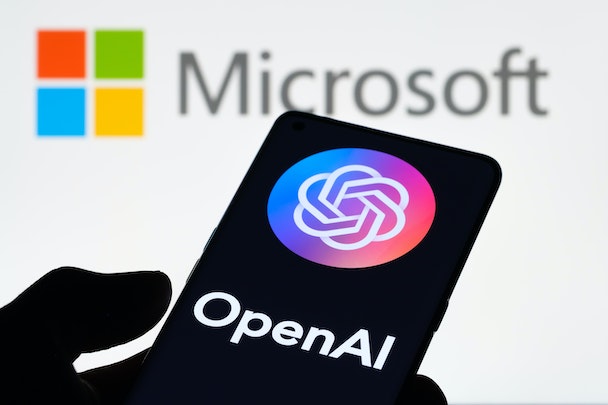Bing’s AI infusion ‘a shot across Google’s bow.’ Marketing pros react to the search wars
Could Microsoft eventually surpass Google and become adland’s preferred search and browsing provider? Is that even possible? We asked marketing experts to find out.

Microsoft has been investing in OpenAI since 2019. / Adobe Stock
The AI-powered search engine wars are in full gear.
Earlier this week, Microsoft launched a suite of new, AI-powered features for both Bing and Edge - the company’s search and browsing platforms, respectively. The features (which include improved search capabilities, more thorough answers, an interactive chat experience and content generation) have been designed to provide a more frictionless user experience. They also give Microsoft more powerful weapons to aim at Google, currently the undisputed reigning champion of both search and browsing.
Advertisement
“We think of these tools as an AI copilot for the web,” Yusuf Mehdi, Microsoft’s corporate vice-president and consumer chief marketing officer, wrote in a company blog post published Tuesday.
Microsoft’s AI-powered upgrades have largely been made possible thanks to the company’s ongoing partnership with OpenAI, the start-up behind the large language model GPT-3 and the text-generating AI model ChatGPT. Microsoft made its third major investment in OpenAI in January; The New York Times reported that the total amount of that investment was $10bn.
Microsoft has a long way to go to catch up with Google. According to data from Statista, Google Chrome facilitated around 84% of online searches as of December, while Bing - the second-most popular browser in the world - accounted for just under 9%. But Microsoft could potentially have an edge over Google when it comes to AI, aided both by its partnership with OpenAI and by Google's recent debacle with Bard, its new AI-powered chatbot.
Bard made headlines when it stated an erroneous fact about the James Webb Space Telescope in a demo video posted to Google's official Twitter account earlier this week. It caused Google’s parent company Alphabet’s market value to plunge by around $100bn.
Here’s what experts have to say about Microsoft’s AI-powered upgrades and its implications for the marketing industry:
Mark Penn, chief executive officer at Stagwell and former executive vice-president and chief strategy officer at Microsoft
For the first time in many years, there will be real competition in search as Microsoft just fired a shot across Google’s bow with its [new upgrades]. This will change people’s access to information through technology in major ways, and it’s the first development of practical AI that people can really see and use.
Advertisement
Rajkumar Venkatesan, professor at the University of Virginia Darden School of Business
Inclusion of new AI-powered features in Bing has certainly made it more competitive with Google. It is imperative for marketers to reach consumers where they are. If more consumers move towards Bing, the marketing dollars will follow the same direction.
Brian Yamada, chief innovation officer at VMLY&R
The race for the evolution of search is escalating quickly. Microsoft's partnership with Open AI seemed to provoke Google to launch its LaMDA-powered Bard. Search is shifting from organization to synthesis. Moving from a list of top links to an assembled answer. In this early phase of [generative AI], the immediate synthesis of an answer is very enticing and easy. But long-term, the platforms will have to deal with provenance and help its users understand its sources and give users the ability to investigate the quality of these synthesized responses.
Dan Gardner, cofounder and executive Chairman, Code and Theory
The accessibility of AI-powered features in search platforms like Bing allows everyone, especially marketers, to upskill productivity, enable better personalization, and layer in a deeper context that will set the creative bar much higher. It will allow creativity to become a practice and a way of thinking, as opposed to just an innate skill - similarly to how Instagram made everyone a photographer.
Justin Lewis, chair of Constellation, a collection of Stagwell agencies
There’s been little innovation in search since it was first introduced. With AI-powered features, search as we know it is dead. If Bing can beat Google to the market with this technology, it opens limitless opportunities for both the consumer and the advertiser. The outputs have the potential to be more progressive, personalized and conversational. [It can also] improve CRM and ad performance with the ability to test in real time. And that’s just beginning to scratch the surface of what the technology is capable of.
Advertisement
James Huerta, executive director of creative technology at Havas CX
This week’s unveiling of an OpenAI-powered Bing search will mean sudden, steep growth of a search engine that has been struggling for years to become a household name. Whether that growth will be sustained depends on how successfully Microsoft rolls out AI-powered features across the rest of its product suite and [how well it] can keep users in its ecosystem. However, with the surprise Google Bard announcement likely driving up the timing of the Bing release, we are in for an AI-powered search engine war. Pop some popcorn, but my money is still on Google.
For the latest in AI, web3 and the other frontiers of technology, sign up for The Emerging Tech Briefing newsletter here.
